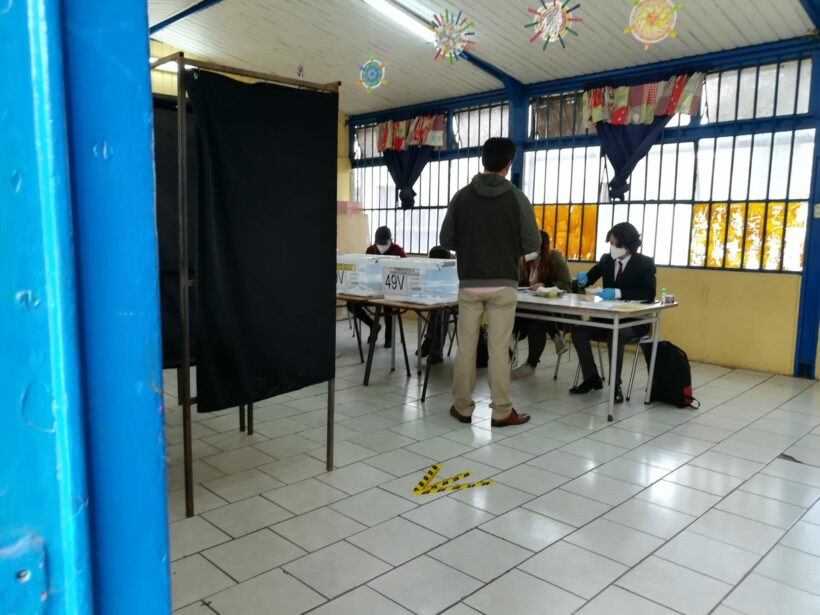“I never thought I would be defending Pinochet’s Constitution”, said recently María Pardo, constitutional councillor of Convergencia Social (La Segunda; 18-10-2023), that is, one of the top leaders of the Frente Amplio! And a few days ago, the centre-left philosopher Renato Cristi acknowledged that “in the last fifty years” the mentality of Chileans has been changed “against the grain of the Chilean tradition that ends in the Social State enshrined in the Republican Constitution of 1925”, so that “private providers motivated by profit can provide basic goods such as health, education and pensions” (El Mercurio; 12-10-2023). Although Cristi personalises this triumph in Jaime Guzmán, it is ultimately a great historical triumph of the right-wing, which imposed its extreme neoliberal model through the dictatorship and then managed to get the Concertación to legitimise, consolidate and “perfect” it.
In effect, the “dilemma” for the Chilean people in next December’s plebiscite will be to approve a constitutional text even more right-wing than the current one; or, if they reject it, to maintain the current text imposed in 1980 by Pinochet and take over -with some reforms- by Lagos and the Concertación in 2005! The country has reached this degree of right-wingisation, despite the fact that, since 1990, the Chilean people have succeeded six times in electing proclaimed centre-left presidents who have pledged to seek the replacement of the neoliberal model imposed by the dictatorship!
Obviously, something very strange and undemocratic has happened in these 33 years (the “30 years” questioned in the social outburst). The key to the answer can be found in the underhanded right-wing shift that the Concertación’s leadership underwent and so skilfully concealed from its socio-political rank and file. As Edgardo Boeninger -considered by Christians and Moors alike as the Concertación’s leading ideologue- bluntly acknowledged, in the late 1980s the leadership reached a “convergence” with the economic thinking of the right, “a convergence it was politically unable to recognise” (Democracia en Chile. Lecciones para la gobernabilidad; Edit. Andrés Bello, 1997; p. 369).
And in order to successfully conceal his right-wing tendency, he proceeded in 1989 -before assuming his safe Presidency of the Republic- to give away “underhandedly” the future parliamentary majority that awaited him if the 1980 Constitution had remained intact (remember that its original design was intended for a Pinochet ratified as president in 1988); agreeing with Pinochet and the right 54 constitutional reforms (as a package), where the most transcendental -unknown to this day! was a change in the quorums for the approval of laws, to the detriment of the Concertación!…
And along the same lines, since 1990 he developed policies -also underhand- aimed at putting an end to the numerous centre-left newspapers and magazines that had sprung up -with external financial support- during the 1980s. This was done by discriminating against state advertising, blocking foreign aid and proceeding – by members of the Concertación – to buy some media outlets and then close them down. And it did the same with the media of that nature that emerged in the 1990s. Thus, the approval of all new legislation with the support of the right (“politics of consensus”) went unchallenged by the left and became “natural” over time.
The subsequent emergence of the Frente Amplio -despite its discourse- did not constitute a real alternative for changing the system either, as was proven by its subordination to the consensual agreement of the right and the former Concertación made on 15 November 2019 with the aim of neutralising the strong social outburst of protest in October. And as has been verified with the orientation of the current government in which all the key ministries have been handed over to figures from the former Concertación; and in which the subordination to neoliberal globalisation was consolidated -despite all the announcements to the contrary- with the signing of the TPP11 and the alignment of Chile to the United States and NATO in the Russian-Ukrainian war.
Finally, the deception of the 15 November agreement’s promise of a “new constitution” has become increasingly clear. First, with the undemocratic two-thirds quorum. Then, with the “surrender” of the Convention members to have delivered to the traditional right alone the power to block the legislation of a new Constitution in the event that the “I approve” side wins. And finally, with the use of the disinformation created by its almost total communicational power to deceive the majority of the people into voting “Reject”.
Not to mention the “infamous agreement” – as Miguel Lawner so aptly called it – that has governed this new process in which all semblance of democracy has been forgotten. First, because a “new” Constitution has now been made by the current Congress, directly through the configuration of its twelve fundamental bases; and, indirectly, through a commission of “experts” appointed by the same Congress that would elaborate a first draft. And then, because this text could only be amended by 3/5 of a “Constitutional Council” elected on the same electoral basis as the current 50-member Senate, which undemocratically favours the right.
Moreover, with the unthinkable triumph of a still more right-wing party (Republican) in the election of the Council, it has come to the point that the plebiscite definition in December will be between keeping the current Pinochet-Lagos Constitution (inspired by Jaime Guzmán) or replacing it with an even more right-wing one, drawn up by the party led by José Antonio Kast! In other words, a total victory for the right.










